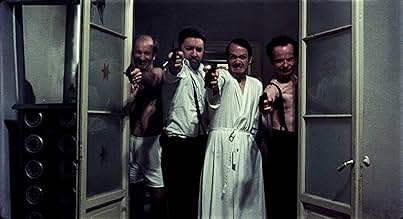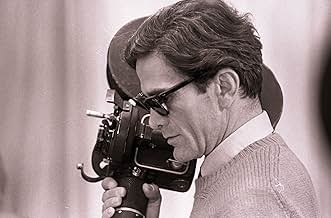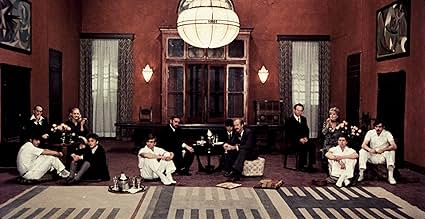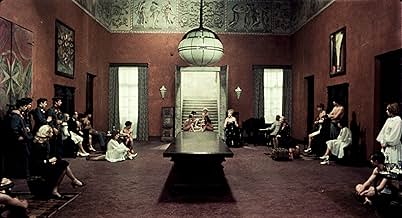
Reproduzir clip3:12
Assistir a If You Liked Terrifier 3, Watchlist These Endurance Horror Classics
Durante a Segunda Guerra Mundial na Itália, quatro fascistas encurralaram nove adolescentes e os submeteram a cento e vinte dias de torturas.Durante a Segunda Guerra Mundial na Itália, quatro fascistas encurralaram nove adolescentes e os submeteram a cento e vinte dias de torturas.Durante a Segunda Guerra Mundial na Itália, quatro fascistas encurralaram nove adolescentes e os submeteram a cento e vinte dias de torturas.
- Direção
- Roteiristas
- Artistas
- Prêmios
- 2 vitórias no total
Uberto Paolo Quintavalle
- Eccellenza
- (as Umberto P. Quintavalle)
Hélène Surgère
- Signora Vaccari
- (as Helene Surgere)
Resumo
Reviewers say 'Salò, or the 120 Days of Sodom' is a controversial film exploring power, corruption, and depravity. Based on de Sade's work, it depicts extreme abuse by fascists. Many find it disturbing yet artistically significant, while others criticize its graphic content and slow pace. Its examination of fascism and power abuse is noted, sparking debates on its artistic and moral value.
Avaliações em destaque
It appears most people find this movie to be sick, pointless, and without substance. That's unfair.
This is the strongest movie I've ever seen, and it made an IMPORTANT impression on me, a big horrorflick-devotee. It made me question a lot of things about former favourite films, and made me realize how sick it is to make horror and violence into entertainment. The problem with most movies is that violence is not portrayed violent enough, horror isn't portrayed horrible enough. Most 'thriller' films have these ingredients softened so that people can enjoy it, and THAT'S sick. This movie is SANE. It shows horror and violence as it IS - totally revolting and disgusting.
I sat as on needles for 1 hour 40 minutes, and felt really bad watching this film. It grossed me out, but I understood why this film is both good and important. It gives a sane perspective on violence, as opposed to SICK, SICK Hollywood-action where people get killed by 'heroes' and nobody raises an eyebrow.
This is the strongest movie I've ever seen, and it made an IMPORTANT impression on me, a big horrorflick-devotee. It made me question a lot of things about former favourite films, and made me realize how sick it is to make horror and violence into entertainment. The problem with most movies is that violence is not portrayed violent enough, horror isn't portrayed horrible enough. Most 'thriller' films have these ingredients softened so that people can enjoy it, and THAT'S sick. This movie is SANE. It shows horror and violence as it IS - totally revolting and disgusting.
I sat as on needles for 1 hour 40 minutes, and felt really bad watching this film. It grossed me out, but I understood why this film is both good and important. It gives a sane perspective on violence, as opposed to SICK, SICK Hollywood-action where people get killed by 'heroes' and nobody raises an eyebrow.
This is on the list of most disturbing movies ever. But it's not disturbing for the sake of it. There is an underlying exposition of a fascist government and it's ability to control to the most depraved extremes. I don't need to go into the plot, just don't watch if your skin crawls easily.
Apparently based loosely on the Marquis de Sade's eponymous story, it feels dirty...it feels icky. You will not finish the film feeling happy, relieved, redeemed, or satisfied. You will feel that humanity is capable of terrible things and sometimes for no real reason other than they can. It shows what happens when people blindly follow terrible people and abandoned their own sense of decency. The following orders defense will never work. When you've become an accomplice you ate equally guilty.
This movie has depth, but it's not an easy watch. It's not for a simple eve with a date. I can't imagine watching this with anyone other than fellow film students or a significant other you've been with for years.
Apparently based loosely on the Marquis de Sade's eponymous story, it feels dirty...it feels icky. You will not finish the film feeling happy, relieved, redeemed, or satisfied. You will feel that humanity is capable of terrible things and sometimes for no real reason other than they can. It shows what happens when people blindly follow terrible people and abandoned their own sense of decency. The following orders defense will never work. When you've become an accomplice you ate equally guilty.
This movie has depth, but it's not an easy watch. It's not for a simple eve with a date. I can't imagine watching this with anyone other than fellow film students or a significant other you've been with for years.
Reportedly, when the executives of one, now defunct, American film company saw "Saló", which they helped co-finance and had distribution rights on, they were so disturbed and embarrassed that they didn't know what to do. Are we going to release this thing? With our company name on it? Where?
They had to show that they released it somewhere in the U.S. or territories.
So they did. In a small theater in El Condado area near San Juan, Puerto Rico.
There's where I saw it. In the mid-70's. With the film company's name on it.
Is it any good? Well, I'm no great admirer of Pasolini. Frankly, I find his movies intolerable. And "Saló" is no exception. But, unlike his Trilogy of Life ("The Decameron", "Canterbury Tales", "Arabian Nights") where he at least displayed some flair and humor, this one is a different animal.
His style was always somewhat ponderous. In "Saló" it is heavily, oppressively didactic: static tableaux-style framing, a deliberately slow pace, no humor whatsoever, and actors who don't play characters but conceits. Although Pasolini uses De Sade's "120 Days of Sodom" as scaffolding and as a pointed commentary, "Saló" is actually based on real events that happened in the Republic of Saló in Northern Italy, where a group of wealthy fascists abducted a large group of young men and women, went on to debase them, and after they were done with them they killed them. Pasolini staged all the scenes as demonstrations of degradation and cruelty. And he does not flinch.
At the end he includes a bibliography.
It's an unpleasant experience.
Clearly, Pasolini, an award-winning poet and one of the leading intellectuals of his time, was very angry when he did this moving picture. He wanted to send a message to Italy and to the world.
It was his last film.
Months later he was murdered.
After several weeks of being in release, the theater was raided by our local vice authorities.
They had to show that they released it somewhere in the U.S. or territories.
So they did. In a small theater in El Condado area near San Juan, Puerto Rico.
There's where I saw it. In the mid-70's. With the film company's name on it.
Is it any good? Well, I'm no great admirer of Pasolini. Frankly, I find his movies intolerable. And "Saló" is no exception. But, unlike his Trilogy of Life ("The Decameron", "Canterbury Tales", "Arabian Nights") where he at least displayed some flair and humor, this one is a different animal.
His style was always somewhat ponderous. In "Saló" it is heavily, oppressively didactic: static tableaux-style framing, a deliberately slow pace, no humor whatsoever, and actors who don't play characters but conceits. Although Pasolini uses De Sade's "120 Days of Sodom" as scaffolding and as a pointed commentary, "Saló" is actually based on real events that happened in the Republic of Saló in Northern Italy, where a group of wealthy fascists abducted a large group of young men and women, went on to debase them, and after they were done with them they killed them. Pasolini staged all the scenes as demonstrations of degradation and cruelty. And he does not flinch.
At the end he includes a bibliography.
It's an unpleasant experience.
Clearly, Pasolini, an award-winning poet and one of the leading intellectuals of his time, was very angry when he did this moving picture. He wanted to send a message to Italy and to the world.
It was his last film.
Months later he was murdered.
After several weeks of being in release, the theater was raided by our local vice authorities.
disturbing. this is the basic conclusion about the last film by Pasolini. denunciation of fascism and bourgeoisie. a masterpiece. last fight of Pasolini against his demons. disgusting. a trash. demonstration of madness. chaotic and boring and scatological. for me, it is only the end of a way. a kind of verdict. after a career in search of truth and beauty and the measure. Salo is a social and political manifesto. attack against hypocrisy and denunciation of the traces of fascism. a film as a form of exorcism. cruel and honest and hopeless. but, after 40 years, it is perceived in different manner. its message is suffocated by the violence of images. the temptation to discover it as portrait of consumerism is covered by the forms of eroticism. and about the waves of prejudices. it is a Pasolini. the last. this is only important thing. the rest - manifestation of personal perceptions.
"Salo: The 120 Days of Sodom" (1975): Be prepared for one of the roughest films you'll ever see. This was Pasolini's last, and going by what I've seen, his vision only became bleaker and more disturbed as the years clawed along. Using the Marquis de Sade's ideas on the decadence of 18th century France, Pasolini represents Fascist Italy (1944-45). We are shown the upper class always removed and protected from the outer world as predators of the poor, weak, young, and less educated. A group of wealthy adults shop amongst the kidnapped older children of bourgeoisie. They choose eighteen, and steal them away to a hidden mansion, where there is no escape. There, the adults live out every twisted fantasy they've ever had or can now muster, while demeaning, raping, and torturing the youngsters. The teens react in many ways, none of which are "pretty". This entire film experience MUST be viewed as a symbolic, emotional "explanation" of what it was like to live under Nazi/Fascist rule (in this case), and how an otherwise normal, decent society could be turned into lunatics and sub-animals. Although made 30 years ago (with the usual weaker production qualities of that era), I cannot think of another work which so blatantly and painfully illustrates what those in power are capable of doing when boredom gives rein to impulse. In comparison, "Lord of the Flies" barely lights upon these issues, "Pink Flamingos" was but a tiny, kitschy springboard, and "Schindler's List" described a much narrower range of degradation. To this day, "Salo:
" is banned in some countries. This is NOT a film about acting, lighting, sound, camera work, etc.. This is a film about states of mind theirs then, ours now. P.S.: If you are interested in set design, this one is FILLED with original Cubist/Bauhaus/Futurist/Moderne furnishings, murals, and art. Spectacular. Those styles were not yet being reproduced, so Pasolini used the real thing. There is also an interesting use of a Charles Rennie MacIntosh chair
which will alter how you see this design from here on out.
Você sabia?
- CuriosidadesDespite the grim subject throughout the film, in an interview on the second disc of the Criterion Collection box set, actress Hélène Surgère claimed the mood was actually rather jovial on the set and that none of the teenage actors were actually harmed or traumatized. She said the abundance of teenagers who had never acted before led the mood to be happy and at times, even fun, with the cast often playing practical jokes on each other. She also said that the movie was literally "made" in the editing room and the filmmakers had no idea how grim a movie it was until they saw the finished product at the premiere.
- Erros de gravaçãoWhen the Duke kisses several victims during Sergio and Renata's wedding, some victims and Ezio begin to laugh, off the character.
- Citações
The President: [while eating a meal of feces] Carlo, do this with your fingers.
[the President sticks two fingers in his mouth]
The President: And say, "I can't eat rice with my fingers like this."
Male Victim: [with fingers in his mouth] I can't eat rice.
The President: Then eat shit, you little bastard.
- Cenas durante ou pós-créditosEssential Bibliography: Roland Barthes: 'Sade, Fourier, Loyola' (Editions du Seuil); Maurice Blanchot: "Lautréamont et Sade' (Editions de Minuit; in Italy Dedalo Libri); Simone de Beauvoir: 'Faut-il brûler Sade' (Editions Gaimard); Pierre Klossowski: 'Sade mon prochain, le philosophe scélérat' (Editions du Seuil; in Italy SugarCo Edizioni); Philippe Sollers: 'L'écriture et l'experience des limites' (Editions du Seuil)
- Versões alternativasThe film was rejected for cinema by the BBFC in 1976 and a private showing of the uncut version at the Old Compton Cinema Club in London's Soho resulted in a police raid and confiscation of the movie. A heavily edited version - minus 6 minutes of footage including scenes of torture, homosexuality and excrement eating, and including a 4 minute prologue describing the history of the town of Salo - was later prepared by UK censor James Ferman for club showings. The film was finally passed completely uncut for cinema and video in the UK in December 2000.
- ConexõesEdited into Histoire(s) du cinéma: Une histoire seule (1989)
- Trilhas sonorasPrelude in C minor
(uncredited)
Composed by Frédéric Chopin (uncredited)
Played by Arnaldo Graziosi (uncredited)
Principais escolhas
Faça login para avaliar e ver a lista de recomendações personalizadas
Detalhes
- Data de lançamento
- Países de origem
- Idiomas
- Também conhecido como
- Saló o los 120 días de Sodoma
- Locações de filme
- Empresas de produção
- Consulte mais créditos da empresa na IMDbPro
Bilheteria
- Faturamento bruto mundial
- US$ 1.808.595
- Tempo de duração1 hora 57 minutos
- Mixagem de som
- Proporção
- 1.85 : 1
Contribua para esta página
Sugerir uma alteração ou adicionar conteúdo ausente

Principal brecha
What is the streaming release date of Salò, ou os 120 Dias de Sodoma (1975) in Brazil?
Responda
![Trailer [OV]](https://m.media-amazon.com/images/M/MV5BYTczYWExODUtNmQ3NC00MzRhLTkwMGQtNzRjM2M5ZGQzYmVkXkEyXkFqcGdeQXRyYW5zY29kZS13b3JrZmxvdw@@._V1_QL75_UX500_CR0)

























